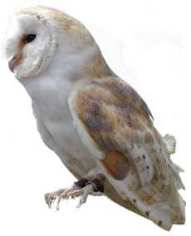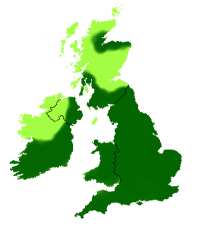|
|
Barn Owl Plate | ||||
|
|
|||||
| Distinguishing Features |  |
||||
| Height 34cm (13in), Golden brown upper body and head with black speckles. Under side is white with light spotting. Unmistakable heart shaped face. | |||||
| Food | |||||
| Mainly small mammals; voles, mice. occasionally small birds. | |||||
| (Tytonidae)
Tyto alba |
|||||
|
|
|||||
 |
Nesting | ||||
| All year round but mainly spring/summer. Clutch of 4 to 7 eggs, white, laid on pellets. 2 broods. Incubation appx 30 days. Eggs tended by female, both parents tending the nestlings. | |||||
| Habitat | |||||
|
Farmland, open grassy countryside, verges, hedges and embankment |
|||||
|
The darker green on the map above indicates
where you are most likely to see a Barn Owl.
|
|||||
|
|
|||||
| Other information | |||||
|
The Barn Owl has excellent eye sight, they also have accute hearing which it employs to great effect; pin pointing its prey with great accuracy. In flight the owl is almost silent, flying slow and quite low over the ground. Hovering above its hunting ground it searches for its prey. If caught in the headlights of a car the colour of the bird appears to change to a ghostly white. Barn Owls do not make nests as such. Located in barns, old buildings, hollow trees and cliff ledges the Owl will lay its eggs on digorged pellets. The Barn Owl is nocturnal by nature but may also be seen during the day. |
|||||
| [Home] [News] [Gallery] [Birds] [Discover] [About] [Contact] [Members] | |||||